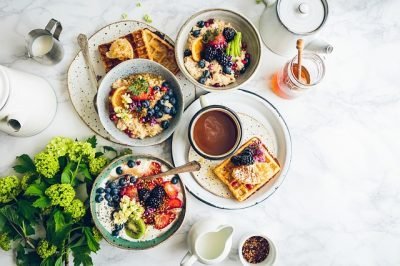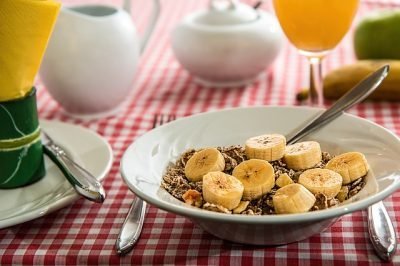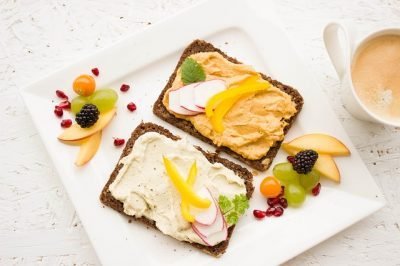Tempting or inevitable as it sometimes is to skip the first meal of the day, be it because we’re trading off breakfast for a couple extra minutes in bed before heading out to class or work, or because our stomachs just can’t handle food first thing in the morning without leaving us queasy and nauseous, breakfast isn’t called the most important meal of the day for nothing.
Selecting the right mix of foods to start you off can and does make a marked difference to how you fare for the rest of the day – the proper balance means you won’t be hankering for snacks come mid-morning or feel yourself getting hungrier faster, instead finding yourself more alert and in a better mood than you would be on an empty stomach. In fact, studies have indicated that compared to those who skip out on breakfast, people who make a point to top up on nutrition after a prolonged period of time without nourishment show better concentration and information retention abilities as well as a lower propensity to gain weight or get tired easily.

Nutritionists more or less agree that the ideal breakfast plate should be about a quarter carbohydrates, a quarter protein, and the rest fresh fruits and veggies. But this doesn’t mean you need to settle for boring or unappetizing treats for the first meal of the day – you can still have your runny poached egg on a hunk of warm toast, your pancakes and your breakfast bowls, so long as you are aware of what you’re eating and how much of it you should be eating.
So let’s break down what it takes to make up a good breakfast, that’s not only yummy, but filling and healthy too.
Carbohydrates

Think ‘Sunday morning breakfast’ and many of us will be imagining a steaming stack of pancakes drenched in syrupy goodness to kick off the day, maybe cooking en masse on a griddle. But, turns out, simple sugar doesn’t stick in the stomach for long – it gives our blood sugar a temporary spike, but burns out just as quickly, and we find ourselves getting hungry faster. The same is the case for sugary cereals – any breakfast foods with a helping of refined sugar just stacks on empty calories, with no real nutritional value to offer, and excessive intakes of refined sugar can lead to all manner of health problems.
But we can still enjoy our pancakes and waffles – just swap out your plain flour with whole wheat flour, and you incorporate into your morning meal a good dose of slow-digesting carbs that leave you feeling full longer, so you won’t find yourself craving some cookies or a sandwich hours before lunchtime. Steel cut oats – or any type of plain, unflavored oats, really – are also a brilliant source of carbs and are known to help reduce cholesterol if consumed regularly, as well as being a rich source of healthy nutrients. All these options can be jazzed up without sugar using fresh, in-season fruits, honey and Greek yoghurt – all great additions to your breakfast menus.
Protein
Proteins are great at regulating blood sugar, so incorporating a healthy amount into your morning meal can keep those sugar cravings at bay. Eggs, plain sugar-free yoghurt (or Greek yoghurt, which packs twice as much protein as regular yoghurt), peanut butter and other nut butters and some cheeses, like cottage cheese, are brilliant sources of protein as well as welcome additions to our breakfast tables. In fact, switching out butter and margarine for nut butters like a good helping of peanut or almond butter (which contain the good kind of unsaturated fats) is better for spreading over your whole grain toast or bagel, in terms of giving your breakfast the right healthy balance. Proteins also help keep you full longer.
Fruits & veggies

An apple a day keeps the doctor away, so the saying goes, but since we’re recommended to eat between five to thirteen servings of fruits and veggies a day, incorporating them into our breakfast is a good way of meeting this milestone. You can chop in berries atop your whole wheat pancakes for a good whopping dose of antioxidants, throw in some fresh mango in your overnight rolled oats, sip some freshly squeezed juices and smoothies – not only is natural fruit sweetness a much better alternative to white sugar, but fruits and veggies are unparalleled sources of vitamins, fibers and heapfuls of other nutrients. Avocado, for instance, is a rich source of healthy fats, fibers and nutrients despite the rep it’s amassed as a ‘millennial’ fad-following food, while some dieticians recommend digging into half a slice of grapefruit before a meal, thanks to the fruit’s ability to burn fats, moderate blood sugar and insulin, not to mention all the hydrating, nutritious goodness it brings – quite literally – to the table.
Tea & coffee
No breakfast is quite complete without a dose of caffeine to wake us up – and thanks to caffeine’s health-related benefits, they’re happy companions to our morning meals. Tea, with a lower caffeine profile than coffee, is more hydrating and infused with a bunch of healthy nutrients and antioxidants, with green tea in particular super-charged with vitamins, amino acids, free radical fighting antioxidants and more. Black coffee, if you’re looking for something with more of a punch to shake off the last remnants of sleep from your system in the mornings, is also associated with reducing the risk of getting Type II diabetes as well as several other medical conditions like strokes and Alzheimer’s. Both caffeinated beverages are better taken without embellishments, so skip the sugar and cream for your morning pick-me-ups.
What to avoid
White sugar, syrup or caramel might give you an energy boost to start off the day, but this energy plummets pretty soon, compared to alternate sources of carbohydrates. Meanwhile, while a proper breakfast platter may feel incomplete without some hash browns, a couple of sausages and some crisp bacon, fried foods for breakfast are a generally unhealthy source of saturated fat to consume regularly, and we’re better off saving them for special occasions and treats instead.